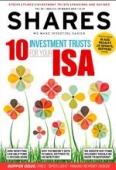Archived article
Please note that tax, investment, pension and ISA rules can change and the information and any views contained in this article may now be inaccurate.
What is a C share?

Conversion shares or C shares are issued by investment trusts to raise money and allow investors to subscribe for new shares without negatively affecting existing shareholders.
It will take time for the manager of a trust to deploy fresh capital and during that period, the cash element would likely generate limited returns, thereby depressing performance. This is known as ‘cash drag’.
By raising money through a C share issue, this negative impact on the performance of the wider portfolio can be avoided because the shares are initially traded separately from the ordinary shares and the cash is invested in a separate portfolio of investments.
The C shares will convert to ordinary shares when either a predetermined level of investment is achieved or on a predetermined date.
How does this conversion process work? Well, if the C shares have a net asset value (NAV) of 100p and the ordinary shares have a NAV of 300p than each C shareholder would receive one ordinary share for every three C shares held.
BENEFITS OF ISSUING C SHARES
Triple Point Social Housing REIT (SOHO) says its latest issue of C shares, raising £47.5m, will help protect dividend coverage on ordinary shares and materially reduce the risk of cash drag.
RM Secured Direct Lending (RMDL) is hoping to raise up to £40m by issuing C shares at 100p. It is targeting an annual dividend yield of 6.5%, but holders of C shares will not be eligible for dividends until the shares have been converted to ordinary shares.
This is expected within six months or when most of the money has been lent. Any new cash will be invested in a diversified portfolio of loans.
SHOULD I BUY C SHARES?
Whether or not you buy C shares depends on if you want exposure to the trust in question and if the existing shares are trading at a premium or discount to NAV.
If the investment trust wants to draw in more investors, it may issue C shares at a discount, but it could also issue them at a premium to cover costs.
Over the last five years, 36 investment trusts have issued C shares with nearly half specialising in growth by investing in debt, according to the Association of Investment Companies. Previous issuers include P2P Global Investments (P2P) and Henderson International Income (HINT). (LMJ)
Important information:
These articles are provided by Shares magazine which is published by AJ Bell Media, a part of AJ Bell. Shares is not written by AJ Bell.
Shares is provided for your general information and use and is not a personal recommendation to invest. It is not intended to be relied upon by you in making or not making any investment decisions. The investments referred to in these articles will not be suitable for all investors. If in doubt please seek appropriate independent financial advice.
Investors acting on the information in these articles do so at their own risk and AJ Bell Media and its staff do not accept liability for losses suffered by investors as a result of their investment decisions.
 magazine
magazine









